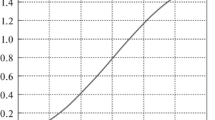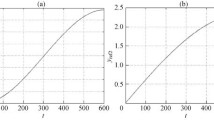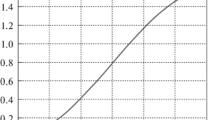Abstract
Iterative learning control requires initial repositioning, while the time functions to be learned should be of periodicity in repetitive control. However, there are cases in practice where the time-varying unknowns are not periodic but repetitive, and repetitive learning control is applicable with avoidance of initial repositioning. In this paper, repetitive learning control designs are presented for a broader class of nonlinear systems over finite intervals. The Freeman formula is modified and used for stabilization of the nominal nonlinear time-varying system undertaken. The global stability of the learning system and asymptotic convergence of the tracking error are established through analysis of both partially and fully saturated learning algorithms, respectively. The repetitive learning control method is theoretically shown to be effective in dealing with time-varying parametric uncertainties.
Similar content being viewed by others
References
Moore J R. Combination open cycle closed-cycle systems. Proc Instit Radio Eng, 1951, 39: 1421–1432
Brockett R W. Poles, zeros, and feedback: state space interpretation. IEEE Trans Automat Cntrol, 1965, 10: 129–135
Arimoto S, Kawamura S, Miyazaki F. Bettering operation of robotics by learning. J Robot Syst, 1984, 1: 123–140
Heinzinger G, Fenwick D, Paden B, et al. Robust learning control. In: Proceedings of the 28th IEEE Conference on Decision and Control, Tempa, Florida, USA, 1989. 2640–2645
Arimoto S, Naniwa T, Suzuki H. Robustness of P-type learning control with a forgetting factor for robotic motions. In: Proceedings of the 29th IEEE Conference on Decision and Control, Honolulu, Hawaii, USA, 1990. 436–440
Wang D W. On D-type and P-type ILC designs and anticipatory approach. Int J Control, 2000, 73: 890–901
Sun M X, Huang B. Iterative Learning Control (in Chinese). Beijing: National Defence Press, 1999
Chen P N, Qin H S, Ye X D. P-type iterative learning control of nonlinear systems with uncertainties. In: Proceedings of the 15th International Conference on Systems Science, Wroclaw, Poland, 2004. 79–86
Lee H S, Bien Z. Study on robustness of iterative learning control with non-zero initial error. Int J Control, 1996, 64: 345–359
Porter B, Mohamed S S. Iterative learning control of partially irregular multivariable plants with initial impulsive action. Int J Syst Sci, 1991, 22: 447–454
Sun M X, Wang D W. Iterative learning control with initial rectifying action. Automatica. 2002, 38: 1177–1182
Saab S S. A discrete-time stochastic learning control algorithm. IEEE Trans Automat Control, 2001, 46: 877–887
Chen H F. Almost sure convergence of iterative learning control for stochastic systems. Sci China Ser F-Inf Sci, 2003, 46: 67–79
Park K H. An averaged operator-based PD-type iterative learning control for variable initial state error. IEEE Trans Automa Control, 2005, 50: 865–869
Park B H, Kuc T Y. Adaptive learning control of uncertain robotic systems. Int J Control, 1996, 65: 725–744
Xu J X, Tan Y. A composite energy function-based learning control approach for non-linear systems with time-varying parametric uncertainties. IEEE Trans Automat Control, 2002, 47: 1940–1945
French M, Rogers E. Nonlinear iterative learning by an adaptive Lyapunov technique. Int J Control, 2000, 73: 840–850
Choi J Y, Lee J S. Adaptive iterative learning control of uncertain robotic systems. IEE Proc D, 2000, 147: 217–223
Ham C, Qu Z, Kaloust J H. A new framework of learning control for a class of nonlinear systems. In: Proceeding of 1995 IEEE American Control Conference, Seattle, Washington, 1995. 3024–3028
Chien C J, Hsu C T, Yao C Y. Fuzzy system-based adaptive iterative learning control for nonlinear plants with initial state errors. IEEE Trans Fuzzy Syst, 2004, 12: 724–732
Xu J X, Yan R. On initial conditions in iterative learning control. IEEE Trans Automat Control, 2005, 50: 1349–1354
Xu J X, Tan Y, Lee T H. Iterative learning control design based on composite energy function with input saturation. Automatica, 2004, 40: 1371–1377
Inoue T, Nakano M, Kubo T, et al. High accuracy control of a proton synchrotron magnet power supply. In: Proceedings of the 8th IFAC World Congress, Kyoto, 1981. 216–221
Hara S, Yamamoto Y, Omata T, et al. Repetitive control system: A new type servo system for periodic exogenous signals. IEEE Trans Automat Control, 1988, 33: 659–668
Tomizuka M, Tsao T C, Chew K K. Analysis and synthesis of discrete-time repetitive controllers. ASME J Dynam Syst, Measure Control, 1989, 111: 353–358
Sadegh N, Horowitz R, Kao W W, et al. A unified approach to design of adaptive and repetitive controllers for robotic manipulators. ASME J Dynam Syst Measure Control, 1990, 112: 618–629
Messner W, Horowitz R, Kao W W, et al. A new adaptive learning law. IEEE Trans Automat Control, 1991, 36: 188–197
Xu J X, Yan R. On repetitive learning control for periodic tracking tasks. IEEE Trans Automat Control, 2006, 51: 1842–1848
Sun M X, Ge S S. Adaptive repetitive control for a class of nonlinearly parametrzed systems. IEEE Trans Automat Control, 2006, 51: 1684–1688
Sun M X, Ge S S, Mareels I M Y. Adaptive repetitive learning control of robotic manipulators without the requirement for initial repositioning. IEEE Trans Robot, 2006, 22: 563–568
Xu J X, Qu Z. Robust iterative learning control for a class of nonlinear systems. Automatica, 1998, 34: 983–988
Sun M X, Cheng Y, Huang B. Higher-order iterative learning control of nonlinear time-varying systems (in Chinese). Acta Automat Sin, 1994, 20: 360–365
Sun M X, Ge S S. Adaptive repetitive learning control of servo mechanisms. In: Proceedings of the 5th World Congress on Intelligent Control and Automation, Hangzhou, 2004. 1212–1216
Sun M X, He X, Chen B. Repetitive learning control for time-varying robotic systems: a hybrid learning scheme. Acta Automat Sin, 2007, 33: 1189–1195
Author information
Authors and Affiliations
Corresponding author
Rights and permissions
About this article
Cite this article
Sun, M., Wang, D. & Chen, P. Repetitive learning control of nonlinear systems over finite intervals. Sci. China Ser. F-Inf. Sci. 53, 115–128 (2010). https://doi.org/10.1007/s11432-010-0018-8
Received:
Accepted:
Published:
Issue Date:
DOI: https://doi.org/10.1007/s11432-010-0018-8




